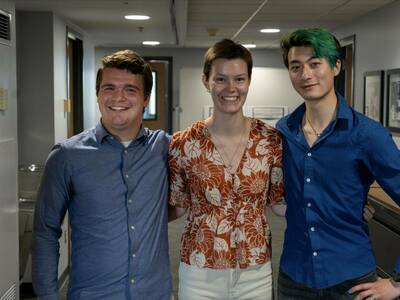
This summer, a team of undergraduate researchers from the University of Notre Dame and Dublin City University (DCU) joined together to analyze a subwatershed in the St. Joseph River Basin to better understand barriers and opportunities to climate adaptation in the region.
Spanning 4,685 square miles—including Notre Dame’s campus—the basin experienced record-breaking floods in 2016 and 2018. The international research exchange sponsored by the Notre Dame Environmental Change Initiative (ND-ECI), DCU, and Notre Dame’s Dublin Global Gateway enabled the students to explore the underlying causes of the flooding—and to propose their own solutions for managing the area more effectively.
"Water management remains a challenge in communities around the world,” explained Danielle Wood, faculty advisor and Program Director for the Notre Dame Global Adaptation Initiative (ND-GAIN), a program within ND-ECI. “Climate change is exacerbating the problem. We need to better understand how to both mitigate and adapt to these dynamic challenges.”
The students gathered in South Bend for a period of eight weeks. Notre Dame undergraduates Maggie Barrett (Economics and Global Affairs) and Daniel Ringrose (Civil Engineering) worked alongside DCU Climate and Environmental Sustainability student Leo Carroll and were mentored by Wood and Brian Wanbaugh, program manager of ND-GAIN. ND-ECI encouraged the students to propose win-win solutions that could benefit the environment and its inhabitants in several different ways at once.
“Water is a great focus for seeking out co-benefits,” explained Wood. “It connects everything. Smart interventions can improve green spaces, provide temperature regulation, increase biodiversity, provide carbon capture, improve flood control, and reduce nutrient and sediment load at the same time.
Over the course of the summer, the students met with community partners from several organizations, including the St. Joseph River Basin Commission, Nature Conservancy, Shirley Heinze Land Trust, and South Bend Public Works, as well as key Notre Dame faculty. These meetings helped the students learn about key issues, stakeholders, and initiatives in the St. Joseph River Basin, as well as current research that may inform nature-based solutions for nearby communities affected by flooding (e.g. FEMA buyouts in the Jewel Woods neighborhood of South Bend) and water quality issues.
The students’ report, “Exploring Barriers & Opportunities for Co-Benefits of Climate Adaptation in the St. Joseph River Basin” identifies challenges in our region’s adaptive capacity and highlights the potential value of nature-based solutions. It notes that limited investment in restoring the area’s wetlands or introducing two-stage drainage ditches to reduce flooding and sedimentation requires careful consideration of the location of the restoration efforts for reaping maximum benefits. Well-placed interventions, the students argue, could keep more nutrients in the soil, improve water quality, and boost biodiversity in the basin all at the same time.
The students hope their work will inspire change both in the St. Joseph River Basin and beyond. DCU student Leo Carroll said, “We hope that by highlighting the interconnected nature of the St. Joseph River Basin to the Midwest and Great Lakes regions as a whole, we can promote large-scale action across communities.”
The students also agree that the opportunity to collaborate with international partners enriched their work. “The DCU team brought an invaluable perspective to our meetings,” said Notre Dame student Maggie Barrett. “Global issues like climate change remind us that we don't live in a vacuum, and these problems aren't unique to us. Programs like this one make progress feel possible.”
Contact:
Brett Beasley / Writer and Editorial Program Manager
Notre Dame Research / University of Notre Dame
bbeasle1@nd.edu / 574.631.8183
research.nd.edu / @UNDResearch
About Notre Dame Research:
The University of Notre Dame is a private research and teaching university inspired by its Catholic mission. Located in South Bend, Indiana, its researchers are advancing human understanding through research, scholarship, education, and creative endeavor in order to be a repository for knowledge and a powerful means for doing good in the world. For more information, please see research.nd.edu or @UNDResearch.
Originally published by at environmentalchange.nd.edu on August 18, 2022.